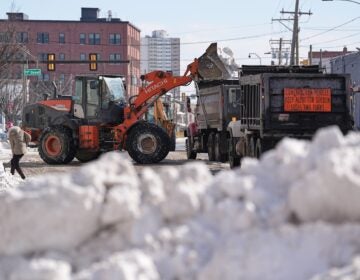In Germantown, real hope rises for better days ahead
-

-

-

-

-

-
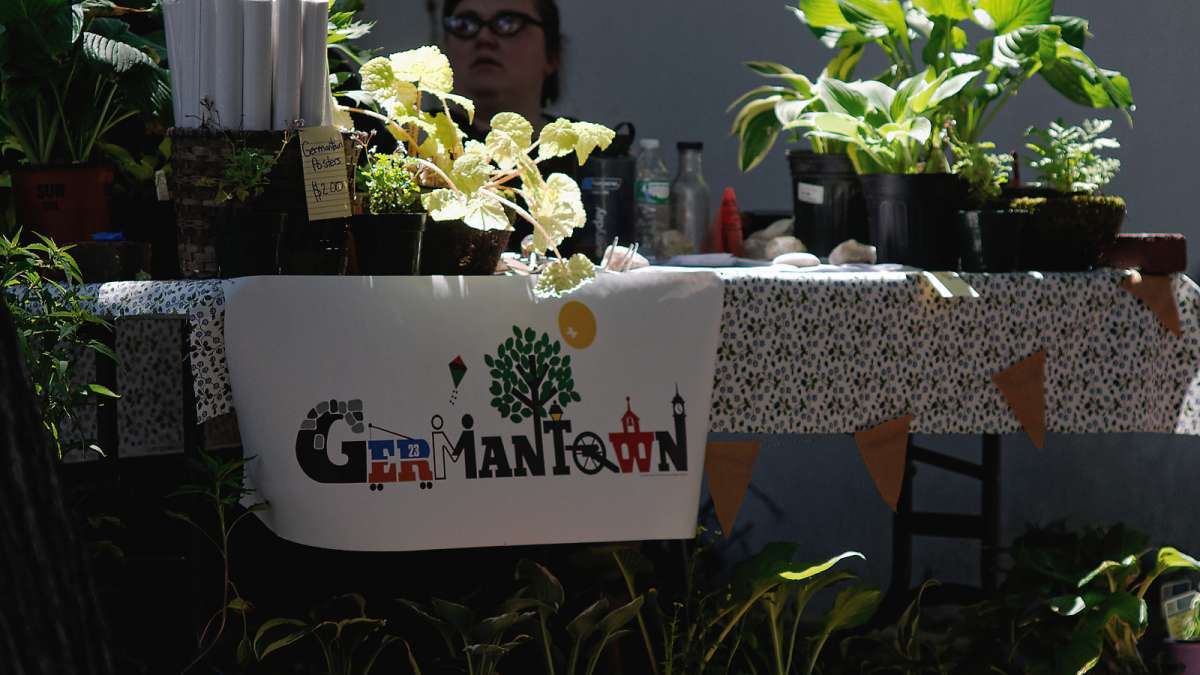
-
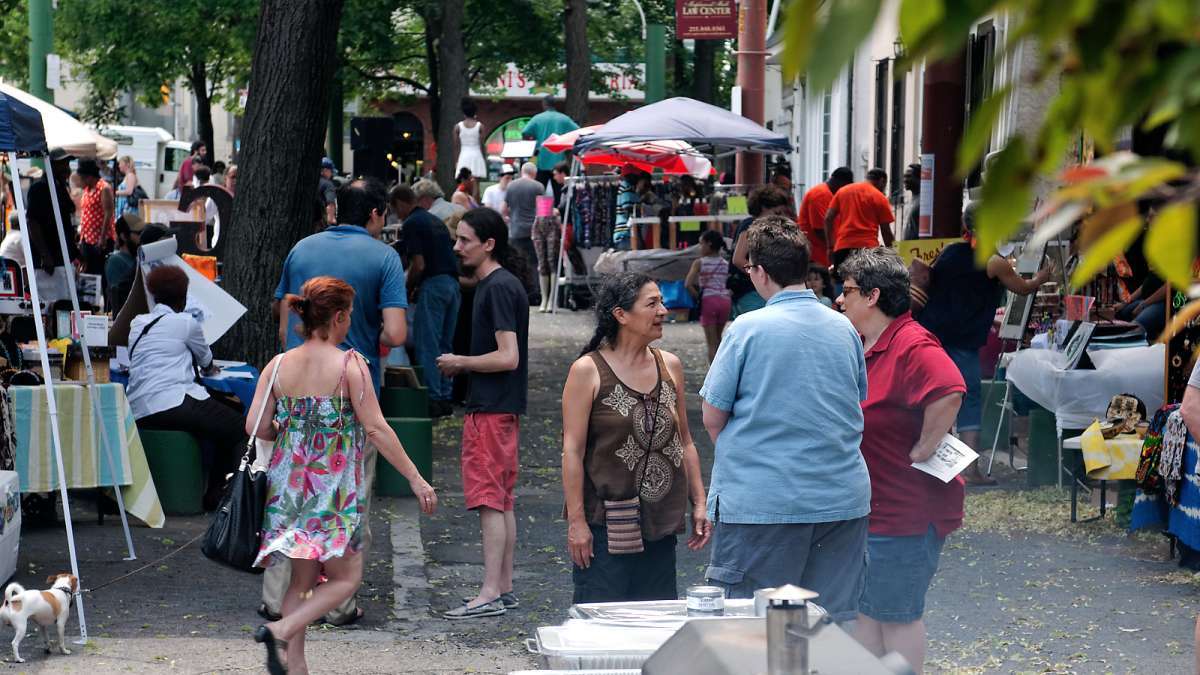
A scene from last year's Re-Imagining Maplewood Mall Festival in Germantown. (Bas Slabbers/for NewsWorks)
On a balmy Saturday, Tyrone Davis sits behind a foldout table blanketed with colorful, Afrocentric fabrics. He’s sweating, but smiling as he watches a street festival in full bloom along Germantown’s Maplewood Mall.
The sight of people strolling this typically empty commercial nook is one reason. A feeling that there’s now a real possibility of that becoming routine is another.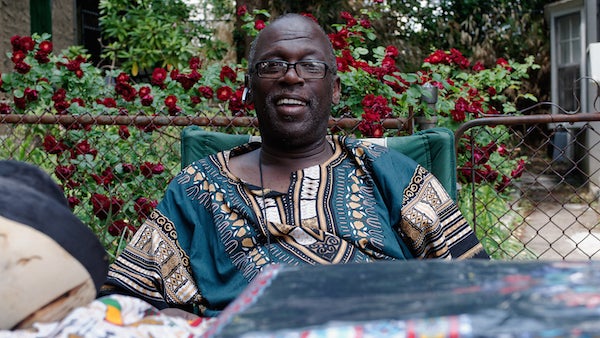
Tyrone Davis in Maplewood Mall. (Bas Slabbers/for NewsWorks)
“It’s a special time in Germantown,” says Davis, a local dance and drum instructor.
For three years now, Germantown United CDC has hosted the Re-Imaging Maplewood Mall Festival with two goals in mind. The first: provide the community with a free, family-friendly event. The second and more important: keep interest alive in a largely hidden, largely forgotten corner of Northwest Philadelphia.
That’s been a bit easier lately. Maplewood Mall is in line for a $2.2 million makeover that will include better lighting, a new street and new sidewalks. But there’s also a growing sense among residents like Davis that the city-funded project is part of a new, long-awaited chapter for Germantown, the start of better days to come.
Building up to a renaissance
Maplewood Mall is footsteps from Germantown Avenue — the cobblestone-lined artery that contains the commercial lifeblood of the neighborhood. In the redesign, neighbors and elected officials see a catalyst for physical and psychological transformation.
Not without good reason.
For the first time in years, several other high-profile development projects are in the works in central Germantown, including the overhaul of Vernon Park — a vast green space along Germantown Avenue — and the stabilization of the historic, long-vacant YWCA next door.
Across the street from the long-vacant Germantown Town Hall, a Maryland-based company is in the process of purchasing Germantown High School and a former elementary school. Budget cuts closed both in 2013.
There are also signs, albeit anecdotal ones, that there is newfound interest from private residential developers.
“Change is in the wind,” says Luke Smith, a Germantown United board member.
Coming together for change
To be sure, Germantown is more stable than a number of struggling neighborhoods in the city. Still, there’s no disagreement that despite this injection of public and private dollars, it’ll take a lot of work — and time — to reverse the decades of disinvestment it’s experienced.
Germantown was once considered a city gem. A solid middle-class neighborhood with safe streets, well-kept Victorian houses and a buzzing business district rivaled only, some say, by Center City.
These days, the neighborhood, home to roughly 40,000, is mostly a shell of its former self. There’s more poverty, violent crime and vacant properties. And a different “G” word — ghetto — is now more commonly heard, particularly by those who live outside of the community.
What caused Germantown’s decline is complicated and a bit contentious. There is some general consensus that de-industrialization, white flight and drugs dealt the first blows beginning around 1960. More than a couple of community leaders maintain that a defunct, publicly funded social service and housing agency, combined with ineffective political leadership, finished things off.
The long shadow of Germantown Settlement — ordered in 2010 to liquidate, in part, for mismanaging its vast real estate holdings — was seen as particularly detrimental to development in the neighborhood.
A fairly fractured civic landscape didn’t help either.
“Germantown was like putting 20 cats in a closet and everyone scratching at each other,” said Apostle Ricci Hausley, a longtime neighborhood activist.
That’s less true today and that’s a big deal to residents. Talk to neighborhood stakeholders and they’ll say that uptick in unity is what’s giving them hope that the neighborhood not only can improve, but will, as long as this fresh grassroots energy can be harnessed for the long haul.
Staying positive
If residents can’t come together and find common ground as the neighborhood undergoes change, there’s a strong feeling that the momentum could deflate and mire the neighborhood.
The phrase “tipping point” has come up more than once.
“We have to be the change that we want to see in Germantown,” says photographer Tieshka Smith, who moved to the neighborhood four years ago. “That means everyone has to make adjustments.”
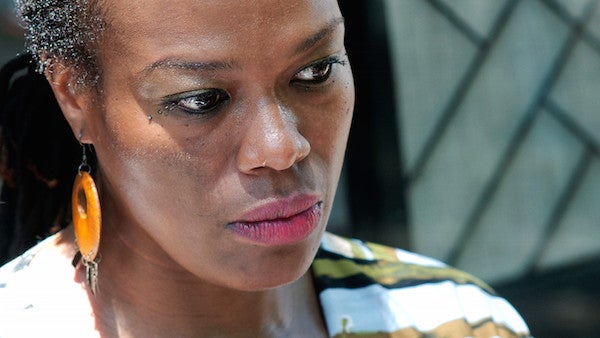
Photographer Tieshka Smith says positivity is the key to turning around Germantown. (Bas Slabbers/for NewsWorks)
For Smith, some of that means shedding some of the internal negativity that’s saddled the neighborhood for years. The narrative now, she argues, must continue to be positive. No matter what.
“If you paint a picture of hopelessness because the data says it’s hopeless, then people are going to be like ‘forget it, I don’t want to be involved. It’s hopeless.'”
A series of projects
Residents say this shift in attitude will be most critical when it comes time to select tenants for property-based projects such as the YWCA, GHS and Robert Fulton Elementary across the street, though that time is likely years, not months away.
Still, if developers continue to hear a strong, unified and positive voice coming from the community, it’s believed there’s a better chance the neighborhood can maintain its character while creating a new identity. And develop at a pace that can protect that fragile balance.
In short, avoid rapid gentrification.
“You have to allow the change to happen slowly and incrementally to permit the community to adjust to it,” says Luke Smith of Germantown United.
The Concordia Group, the company that bid $6.8 million for five shuttered school buildings, including GHS, a hulking, four-story property, and Fulton Elementary, is still months away from completing its due diligence.
“It’s certainly a longer term project,” says William Collins, the company’s managing principal.
This summer, the city will “spruce up” the YWCA and release a request for proposal to potential developers, but it will likely be some time before there’s a finished project. The building needs millions to renovate. Squatters, fires and vandals have all left their mark on the building since it was shuttered in 2006.
Eighth District City Councilwoman Cindy Bass says construction on Maplewood Mall will begin sometime between now and spring 2016. The project’s design elements are still being finalized.
Work at Vernon Park, she adds, is slated to start “any day now” and wrap up in a few months.
Together, those three projects represent a $7.2 million public investment in Germantown.
“The Germantown that you see today is better than the Germantown that you saw five years ago and I think five years from now it’s going to be even better,” says Bass.
A changing landscape
Local developer Ken Weinstein agrees. Through his company Philly Office Retail, he’s been investing in Germantown for more than two decades on projects big and small. By now, his portfolio includes a couple hundred such projects.
The list includes the recent renovation of a vacant church for the Waldorf School of Philadelphia and the overhaul of a handful of properties part of a campus once run by Germantown Settlement.
While many developers, especially commercial ones, are still thinking the time still isn’t right when it they look at Germantown, Weinstein continues to see great potential and, more than ever, real opportunity.
“There will be people two, three, four years from now who dragged their feet, who wished they had gotten in now,” he says.
Over the last three years, the veteran developer has witnessed what he deems are pretty dramatic changes.
For starters, commercial rents are beginning to rise. Properties that once went for $10 per square foot are now going for $12 per square foot. Properties that typically “maxed out” at $14 or $15 are now getting $18 per square foot.
That, says Weinstein, could potentially open the doors for previously hesitant developers.
“All of a sudden your numbers start to work. So there’s that many more properties that you can start to buy and rehab and immediately get a positive cash flow from it.”
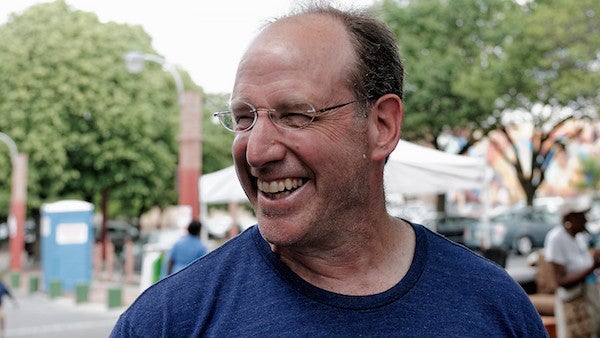
After many years of working in the neighborhood, developer Ken Weinstein says he’s witnessed dramatic changes the past few years. (Bas Slabbers/for NewsWorks)
On the residential side, Weinstein is hearing developers not only talk about Germantown, but also begin to invest. In part, thanks to “Jumpstart Germantown,” a new initiative he launched in March.
The program aims to rebuild Germantown’s ailing residential stock by educating, supporting and extending a line of credit to developers so they can start projects and finish them.
“Having houses fixed up and people moving in with disposable income, then commercial tenants want to relocate on the commercial corridors. It’s an easier sell at that point,” says Weinstein.
At Jumpstart’s first meeting earlier this month, nearly 100 developers from inside and outside of the city showed up. Weinstein was “blown away” by the response.
Financial manager Gabriella Somoza and her brother Oliver recently moved from New York to Philadelphia with hopes of building their nascent “side business” into a stand-alone family business.
“We kind of just fell in love in Philadelphia,” says Somoza.
And, after riding all around the city, Germantown.
The aesthetics of the neighborhood’s architecture was a big selling point, but also its relative stability and what a quick ride it is to Center City — 30 minutes or less.
“No matter what that there’s always going to be interest in not wanting to have to be right on top of each other, not right next to each other,” says Somoza.
What’s more, it wouldn’t take decades to see a return on their investments.
So far, the Somozas own two properties in East Germantown. The first, a single-family home on East Haines Street, is already rehabbed with tenants. The duo recently closed on the second on East Rubicam Street.
They would like for their next property to be in Germantown too.
“Our goal is to stick to a neighborhood,” says Somoza.
Re-Imagining Germantown
Back at Maplewood Mall, blues is pouring into the sticky air from a stage facing Greene Street.
Nearby, David Melvin, a local preacher and baker, stands in the shade. He’s having a good time, but he wishes there were more people flowing through the festival and, in general, the neighborhood.
“You want it like ‘c’mon, c’mon, c’mon,” he says.
But, he gets it. Revitalization is a process and Germantown will be no exception. And maybe, he thinks, it’s better that way.
With time, a little bit of dedication, a little bit of luck and a little bit of dough, the neighborhood may just rise again, he says.
“You gotta start somewhere. It’s better to take a small bite, enjoy that, and not choke on something.”
WHYY is your source for fact-based, in-depth journalism and information. As a nonprofit organization, we rely on financial support from readers like you. Please give today.





